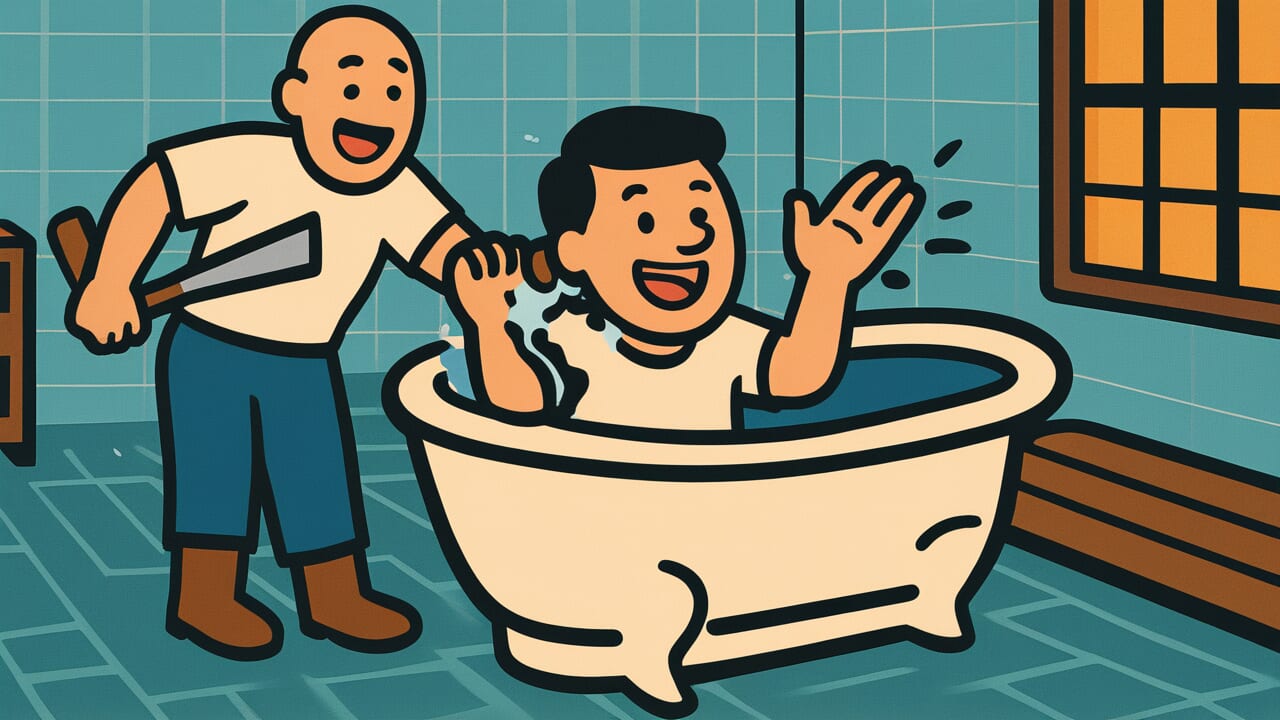How to Read “The washtub laughs at the half-barrel”
Tarai hangiri wo warau
Meaning of “The washtub laughs at the half-barrel”
“The washtub laughs at the half-barrel” is a proverb that warns against criticizing others for faults you also have.
It means the same as “the pot calling the kettle black.” It points out how ridiculous it is to claim superiority when there’s barely any difference between you and the other person.
You use this proverb when someone criticizes others while ignoring their own similar flaws.
For example, a student with poor grades making fun of another struggling student. Or a person who’s always late criticizing someone else for being late.
Even today, people on social media often criticize others for mistakes they themselves make. We tend to be lenient with our own faults but harsh on others.
This proverb sharply captures this human tendency. Its wisdom remains valuable in our modern world.
Origin and Etymology
No clear historical records explain the exact origin of this proverb. However, we can learn a lot by looking at the words themselves.
The “tarai” (washtub) and “hangiri” (half-barrel) were both essential wooden tubs in Edo period households.
The washtub was a shallow, wide tub used for laundry and bathing. The half-barrel was shaped like a barrel cut in half and was also used for water-related tasks.
These two tools were actually quite similar in purpose and form. If a washtub laughed at a half-barrel saying “what an awkward-looking tub,” wouldn’t that be absurd?
After all, the washtub itself isn’t much different. This is the humor the proverb captures.
Common people in the Edo period had a way of seeing human nature reflected in everyday tools.
Because these were items they used daily, the subtle differences between them seemed to mirror human obsession with small superiority.
This proverb has a similar meaning to “the eye booger laughs at the nose booger.” But by using household tools instead, it creates a gentler and more relatable expression.
It’s a phrase born from ordinary life, filled with both humor and self-reflection.
Usage Examples
- He says your handwriting is messy, but his is just as bad. The washtub laughs at the half-barrel.
- She criticized a coworker for being late, but she was late just last week. The washtub laughs at the half-barrel.
Universal Wisdom
“The washtub laughs at the half-barrel” reveals a fundamental distortion in human thinking.
Why do we laugh at others who have similar flaws to our own?
It’s because criticizing others helps us avoid facing our own shortcomings. Confronting our own problems is painful.
But pointing out someone else’s faults gives us a temporary illusion of superiority.
What’s interesting is that this proverb uses the word “laughs.” Not criticizes or condemns, but laughs.
This shows a warm perspective on human foolishness. Because everyone falls into this trap, the proverb doesn’t harshly condemn.
Instead, it encourages self-reflection with a wry smile.
This proverb has endured because humans fundamentally struggle with self-awareness. Just as we can’t see our own face without a mirror, we’re bad at objectively viewing our faults.
That’s why our ancestors used familiar household items as metaphors. They wanted to make this truth easy to understand.
The importance of self-reflection is timeless wisdom. As long as we remain human, we’ll always need it.
When AI Hears This
The capacity difference between a washtub and half-barrel is actually just a few liters. From a larger perspective, it’s within the margin of error.
What’s fascinating is that “laughing at a small difference” creates the same structure between the laugher and the laughed-at.
The washtub laughing at the half-barrel is identical to a bigger tub laughing at the washtub. Only the scale differs.
This is exactly like fractal self-similarity. Whether you view a coastline from satellite photos, ground level, or through a magnifying glass, you see the same jagged patterns repeating.
The structure stays the same at every magnification. Human judgments of superiority work the same way.
Someone earning $50,000 laughs at someone earning $40,000. Someone earning $60,000 laughs at the $50,000 earner. Someone earning $100,000 laughs at the $60,000 earner.
The view from each level differs, but the structure of “looking down at those slightly below” is identical.
Even more interesting is that this self-similarity never ends. No matter how high you climb, there’s always someone “slightly above” you.
The one who laughs is always also being laughed at. It’s an infinite loop in mathematical terms.
Once you notice this nested structure, the meaninglessness of judging superiority by relative differences becomes clear. From the overall scale, all differences are just margin of error.
Lessons for Today
This proverb teaches modern people the courage to pause before criticizing. When you notice someone’s faults, take a breath before pointing them out.
First, look at yourself. That one moment of reflection can dramatically change your relationships.
In our social media age, criticizing others has become easier than ever. But the person on the other side of the screen is imperfect, just like you.
And you, the critic, aren’t perfect either.
The key is not to use this proverb as a weapon against others. Telling someone “you’re the washtub laughing at the half-barrel” just becomes another criticism.
Instead, keep it in your heart as a reminder to yourself. That’s the right way to use this proverb.
Everyone is still growing. No one is perfect. That’s exactly why we can acknowledge each other’s imperfections and support one another.
When you notice someone’s faults, see it as a chance to examine yourself. From there, deeper self-understanding and warmer relationships can grow.



Comments